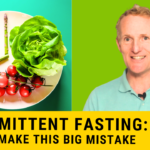Carb cycling is a dietary approach where you alternate your carbohydrate intake on a daily, weekly, or monthly basis.
This simply means, for example, if you are doing it on a daily basis that you can have a carb cycling workout plan that incorporates:
- High carb days, like 50% or more calories coming from carbs
- Lower cab days, with 20% or more coming from carbs
- And no-carb days, where typically less than 10% of calories come from carbohydrates
Not every carb cycling plan includes no carb days and this can depend on physical activity levels for example.
Carb Cycling Rational
The reasoning behind this way of eating and wanting carb cycling results can be for a variety of reasons, such as carb cycling for muscle gain, carb cycling for bodybuilding, and carb cycling for fat loss.
So the general idea is that you eat more carbs when more physically active and fewer carbs when you are less active and that this is thought to provide benefits to your body, like weight loss.
If carb cycling all sounds a bit complicated to you juggling your carbohydrate intake on different days of the week – then you are right. It is!
It calls for detailed meal planning and strict compliance, which many people lets be honest would struggle with.
In addition to this, it has many other problems associated with which include:
- People often focus on weight loss rather than their overall health (aka lose weight and lose health, vs lose weight and gain health on a proper plan)
- According to science, doing this kind of diet won’t make you lose fat weight any faster than other diets, including high carb (1)
- Cutting right back on carbohydrates can cause food cravings and consequent binges
- Many people mistakenly believe that increased insulin levels from eating carbs lead to automatic weight gain as in fat storage, but this is not correct.
- Decreased thyroid output (slower metabolism) (2,3)
- Lower testosterone levels (4)
- Lower immune system function
- Higher cortisol levels
- Higher LDL cholesterol levels
- Impaired mood and brain function
That’s a very long list of downsides!
Now I can personally vouch for seeing many of these same health issues when clients come to work with us and generally they have a host of health challenges when coming off a diet that has a high percentage of fat in it.
- High LDL cholesterol levels
- Lower energy levels
- Excess fat weight that they can’t shift
- Low mood
- Gut imbalances
- Hormones imbalances
- Inflammation
The way forward? Let me explain more in this video here:
Sources:
-
https://pubmed.ncbi.nlm.nih.gov/16685046/
-
https://www.endocrineweb.com/conditions/hashimotos-thyroiditis/hashimotos-thyroiditis-facts-tips
-
https://www.niddk.nih.gov/health-information/endocrine-diseases/adrenal-insufficiency-addisons-disease
-
https://pubmed.ncbi.nlm.nih.gov/11699056/








